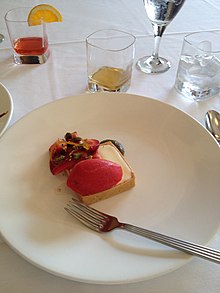Creole cream cheese is a form of farmer cheese that is traditional in the New Orleans area of Louisiana in the United States. It is made from skim milk, buttermilk and rennet, has a mild, slightly tart, slightly sweet taste, and is frequently mixed with cream, sugar and fruit and served as a dessert. It is often used to make Creole cream cheese ice cream.[1]
In homes it was traditionally eaten for breakfast and served with cream, fruit, or sugar;[2] it can also be served on toast with butter, salt and pepper.[3]
History
editThis section needs additional citations for verification. (August 2021) |
According to Mauthe of Mauthe's Progress Milk Barn, an artisan dairy credited with helping resurrect the dish,[4][5] Creole cream cheese originated in the 1800s among people of French ancestry. Instead of forming the curds, they are said to have hung the clabber in a mesh bag in a tree and let the whey drain off.
Creole cream cheese was served in a bowl and cream was poured over it. Mauthe remembers it being eaten on French bread in some areas and on cornbread in other parts of the Southern United States.
Creole cream cheese is listed in the Ark of Taste, an international catalog of heritage foods in danger of extinction, maintained by the global Slow Food movement.
Creole cream cheese's popularity declined during the second half of the 20th century and it became difficult to find. Several dairies in South Louisiana have offered creole cream cheese in the past, including Borden's, Gold Seal and Barbe's. In 1998 it was still available at Dorignac's Food Center on Veterans Boulevard in Metairie.[6] The Gold Seal Creamery that was the last Creole cream cheese factory in New Orleans operated from about 1920 to 1986 and its blond-brick building constructed in 1954 is being converted into loft apartments.[7]
Resurgence
editMore recently, creole cream cheese has had a resurgence. New Orleans native chef David Guas offers creole cream cheese at his Bayou Bakery, Coffee Bar & Eatery in Arlington, Virginia, served with buttermilk biscuits and pepper jelly.[8] The New Orleans Museum of Art (NOMA) included creole cream cheese as part of its 2012 "Art You Can Eat" demonstrations, with Leah Chase making it.[9] Poppy Tooker has also been credited with helping resurrect the dish.[1] The Encyclopedia of Cajun and Creole Cuisine includes instructions on making the dish at home.[1][5]
The intensive process required to make creole cream cheese, a yogurt-like and slightly sweet concoction, has made a comeback including with a cheesecake recipe from the Mauthe (pronounced: /ˈmoʊ.teɪ/; MOH-tay[10]) family of McComb, Mississippi, who operate the Progress Milk Barn, nearly destroyed by Hurricane Katrina.[11]
Creole cream cheese ice cream
editCreole cream cheese ice cream is also a Louisiana tradition.[1][12] The USDA cracked down on dairies over concerns about spoilage and added regulations over milk and cheese production;[when?] production has become far more limited. The ice cream flavor was available at K&B drugstores. Other past producers include Brown's Dairy (formerly Brown's Velvet Dairy) in New Orleans.[citation needed]
John Besh offers a creole cream cheese red velvet ice cream at his Soda Shop in the National World War II Museum. Mam's House of Ice in Houston offers Creole Cream Cheese ice cream.[13] Baskin Robbins offered the flavor in 2011/2012.[14] In April 2013, Blue Bell Creameries re-released the flavor in Louisiana and the Mississippi Gulf Coast region, and in 2018 released the flavor again in the Pine Belt area of Mississippi, most notably in the Ramey's supermarket chain.[15] Another version is made by New Orleans Ice Cream Company.[16]
See also
editReferences
edit- ^ a b c d Tucker, Susan, ed. (2009). New Orleans cuisine: fourteen signature dishes and their histories. Univ. Press of Mississippi. ISBN 9781604731279.
- ^ Tucker 2009, p. 172.
- ^ "Homemade Creole Cream Cheese". Food Network. Archived from the original on 2012-07-24. Retrieved 2013-05-08.
- ^ "Kenny Mauthe". Southern Foodways Alliance. Archived from the original on 2011-06-01. Retrieved 2013-05-09.
- ^ a b Jeffrey P. Roberts (Jun 22, 2007). Atlas of American Artisan Cheese. Chelsea Green Publishing. ISBN 9781603581646.
- ^ Laborde, Errol (May 1, 1998). "The cream team: Last of the Creole cream cheeses". New Orleans Magazine. Archived from the original on September 24, 2015. (subscription required)
- ^ Rebecca Mowbray Creole cream cheese factory in Mid-City turning into loft apartments April 08, 2011 Updated: Saturday, April 09, 2011 The Times-Picayune
- ^ Susan Langenhennig (May 24, 2012). "New Orleans native and chef David Guas returns home to take the stage at NOWFE". NOLA.com.
- ^ "Art You Can Eat at NOMA". Gambit Weekly, bestofneworleans.com. June 12, 2012. Archived from the original on December 11, 2013. Retrieved June 13, 2012.
- ^ Kenny Mauthe interview. Southern Foodways Alliance. 10 September 2019. Retrieved 15 June 2023.
- ^ accessed 6-24-2012 Mauthe's Milklady Cheesecake Progress, MS Appetite for Life, Southern Hospitality (with Andrew Zimmern) Archived May 1, 2012, at the Wayback Machine
- ^ Rima Collin; Richard Collin (Mar 12, 1987). New Orleans Cookbook. Random House Digital, Inc. ISBN 9780394752754.
- ^ Steve Garbarino (June 8, 2012). "Throw a Sno-Ball". The Wall Street Journal.
- ^ What’s Going On With Ice Cream? May 24, 2012 Smithsonian.com
- ^ "Louisiana inspired ice cream flavor" Archived 2013-04-21 at the Wayback Machine, April 3, 2013 KATC.com (News 3)
- ^ Beth Colvin, "Englishman finds N.O. flavors for ice cream" Archived 2016-03-04 at the Wayback Machine, The Advocate, April 24, 2013.
